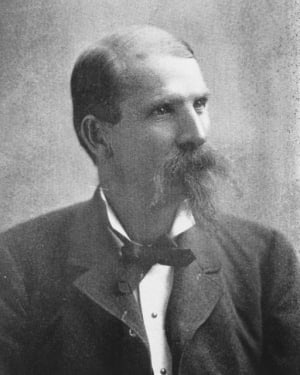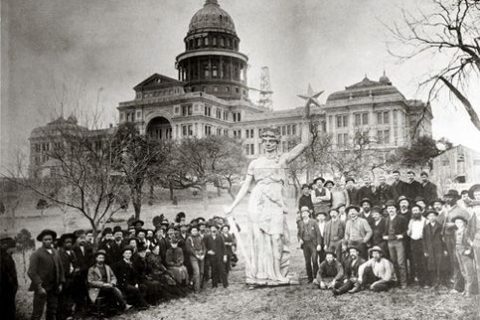Arkansas arrived late to the scene of Manifest Destiny, in regards to Southern States that is. As a result by 1860, the area became a bizarre crossroads of two distinct ethno-cultural groups which did not have ample time to civilize the state by the War Between the States’ beginning. Unlike other such crossroads, Arkansas only formed a small, borderland population primarily of Appalachian stock with only a minor handful of slave owning aristocrats in the southeast. Distant and uncivilized, the Appalachian population, particularly within the northern counties, often opposed secession and held contempt for the Planter class. Regardless, Arkansans still fought valiantly for the Confederacy and accordingly fell under the rule of Radicals during Reconstruction. A frontier state akin more to that of Texas than elsewhere, Arkansas, being of much lower population and acreage, experienced a bizarre Reconstruction riddled with Ku Klux violence and small-scale warfare between competing party factions. This essay will examine the economic, political, and social Reconstruction which transpired in Arkansas.
An undeveloped backwater, the economy of Arkansas never stood strongly within the Confederacy to begin with. Admitted to the Union in 1836, little time allowed for economic development. The state had only begun to find much prosperity or financial growth once many Deep South Planters had begun moving across the Mississippi River in search of fertile land to expand their Cotton Kingdom. Experiencing an economic boom in the 1850s thanks to this immigration, the state shifted quickly from an agrarian subsistence economy to that of a wealthy chattel plantation state. Though the entirety of the populace benefitted from this surge in prosperity, the vast majority of it concentrated within the lowland Delta region, leaving many in the highlands embittered towards the interests of Planters. As with every other Southern State, Arkansas’ financial sectors laid in ruins upon the War’s closing.
Blessed with a moderate governor allowed to continue his tenure even after reunification, Arkansans set about rebuilding the economy. Unfortunately, Arkansas did not escape the cotton shortage of 1865 and 1866, despite being able to reorganize its labor and reemploy Freedmen. As Reconstruction continued, the economy continued to worsen as taxes were increased and corruption ensued under the Radical regime.
Conjunctively with the economy, the political stability of the state had utterly collapsed at submission to Federal invaders. Provisional Governor Isaac Murphy generally kept order without anarchy unfolding despite the Confederacy’s demise. Whereas Confederate governors were ousted and chaos ensued, Murphy’s appointment in 1864 prevented that from occurring. Seeking to heal the pain of warfare, collateral damage remained at a minimum during his tenure, aided strongly by the thin disbursement of the population and the fact most of the fighting was in the southeast by 1864. To his credit, Governor Murphy did well in offering a hand of reconciliation to former Confederates and garnered a deserved reputation for responsible financial practices, leaving behind a budget surplus once leaving office. During this time, the population nominated Democratic Senators to the federal government and ratified a Conservative state constitution, resulting in the infamous reaction by Radicals in Congress.
The Reconstruction Acts of 1867 flipped the political situation on its head, albeit with a delay. Murphy had built such a positive image of himself that he was allowed to remain Governor of Arkansas even after the Fourth Military District had been established as a result of the aforementioned legislation. Completing his term in 1868, the first Radical to rule the state succeeded him. General Ord received appointment as the commander of the Fourth Military District and immediately disbanded the currently Democratic state legislature. With the Reconstruction Acts and the Ironclad Oath disqualifying former Confederates from voting, a Republican legislature was elected, and a new constitution and Governor Powell Clayton was subsequently elected.

Instrumental in founding and building the Republican Party of the state, Clayton served in the Union Army during the War. He interestingly belonged to the Democratic Party prior to the Secession Crisis, yet he shifted to the Party of Lincoln due to the former’s growing fervor. Viewing Reconstruction in military matters, Powell ruled with an iron fist. Caucasians across the state erupted into a furor at the events which transpired in 1868, and the first signs of the Ku Klux Klan manifested in Arkansas not long afterwards. Ku Klux activity spread so quickly in Arkansas, and with such bestial ferocity, that Clayton’s first order of business was its immediate suppression. Activity grew with such intensity that the Klan managed to assassinate as high profile an individual as U.S. House Representative James Hinds in Monroe County on October 22, 1868. Deeming 14 counties incapable of legal, non-fraudulent voter registration, the votes for those counties were simply not counted during the presidential election of 1868 in November. This further fueled the fervent outrage of Democrats who claimed they may have carried the state should those have been counted.
Throughout 1868, the governor spent his time reorganizing and building the state militia. Declaring martial law in 10 counties after the election, Clayton deployed the militia he organized into those areas. Klan violence permeated throughout Arkansas, but the highest concentration of it took place in the northwest region, producing a multitude of clashes and skirmishes known as the Militia War of 1868-1869. Clayton’s actions and militia behaved so quickly and effectively that martial law had been completely lifted by March 1869, making Clayton the only Radical Governor in the South to effectively quell Ku Klux disturbances without federal aid. His following administration unfolded in typical Republican fashion, corruption and all. Extravagantly corrupt as most Radicals, Clayton came under accusations of such and additionally fell out of favor within his divided party. He would later resign in 1871 due to the growing Republican Schism, and Ozra Amander Hadley served as governor for the remainder of the term.
Dividing along the lines of Liberal Republicans and Regular Republicans, the former “Brindle Tails” espoused more moderate policies while opposing financial corruption and largely consisted of Scalawags while the latter “Minstrels” consisted of Carpetbaggers and endorsed an extremist Radical approach while supporting Governor Clayton. The Brindle Tails nominated Joseph Brooks to run against Minstrel Elisha Baxter for the gubernatorial election of 1872. Democrats opted not to run a candidate and supported Brooks due to his support for re-enfranchisement of former Confederates. What resulted may only be described as surreal.
Baxter handily won the election; however, Brooks refused to concede defeat. While Baxter governed, Brooks began building alliances and exhausting every legal approach to overturn the election. They strangely began swapping political positions during 1873. Baxter’s legitimate governorship enfranchised white Arkansans while Brooks allied himself with a number of Minstrels, causing the opposing factions to switch their support. Finally on 15 April 1874, Brooks commenced a coup d’état and ousted Baxter from the State Capitol building with his militia. During his occupation, his militia continued to grow and even seized the state arsenal. Bizarrely, Baxter was allowed to go free as opposed to execution or imprisonment characteristic of a political overthrow. Rallying his own militia of Democratic supporters, the two engaged in a series of clashes known as the Brooks-Baxter War. Over the course of a month, neither side gained any ground and the Grant Administration finally settled the quarrel by declaring Baxter the lawful government. Brooks’ militia soon disbanded, and order was restored. The entire affair and preceding factionalism weakened the Republican Party to such a degree it had all but willingly handed over power to the Democrats in the election of 1874.
Little more may be said of the social conditions which have already been elaborated upon whilst covering other topics. A small, majority Caucasian population divided between Planters in the lowland and Appalachians in the highland produced differing social experiences. Though the War wrecked havoc in the Delta, the ferocious resistance to Radicals occurred primarily within the highland sections, particularly the northwest. Jaundiced due to the unmerciful martial law of Governor Clayton and the economically inept policies which found passage between 1868 and 1874, Arkansans leapt at the opportunity to take advantage of a weak, divided Republican Party. Redemption came to Arkansas in a most peculiar fashion.
The Reconstruction of Arkansas, upon close inspection of the economic, political, and social circumstances, conjures descriptors such as “abnormal” and “bizarre.” Lucky in the beginning, Arkansans experienced a ruthless, but disunited, Reconstruction afterwards which left Democrats in a position to easily seize control by the end of it with little opposition. Scant else may be said of the period, save for a few minor details. The Federal government allowed Democrats control of the state, and a new constitution was drafted and ratified in 1874, with the party holding power until the 1980s. Southern Democracy had been reinstated following the end of such a volatile Reconstruction experience.
“The White people of the South are the greatest minority in this nation. They deserve consideration and understanding instead of the persecution of twisted propaganda.” –Strom Thurmond






IIlluminating article.
I grew up in Springdale. I dont recognise it any more because it is defacto Northern Mexico. All so the Tysons and Waltons could make a buck.
Arkansas is the most thoroughly reconstructed state in the South, and I’ve lived in every Southern state. The white men in Arkansas duck their heads and adopt servile grins whenever they interact with blacks. And the blacks in Arkansas are the most sullen and bellicose you will ever encounter. The entire state has a fog of gloom over it, which is sad, because it’s a gorgeous place.
Great article! Born and raised in the NW corner of the state, I implore you to also look into the ‘Pope County Militia War’ headed by none other than one of my personal heroes; George W. Newton.